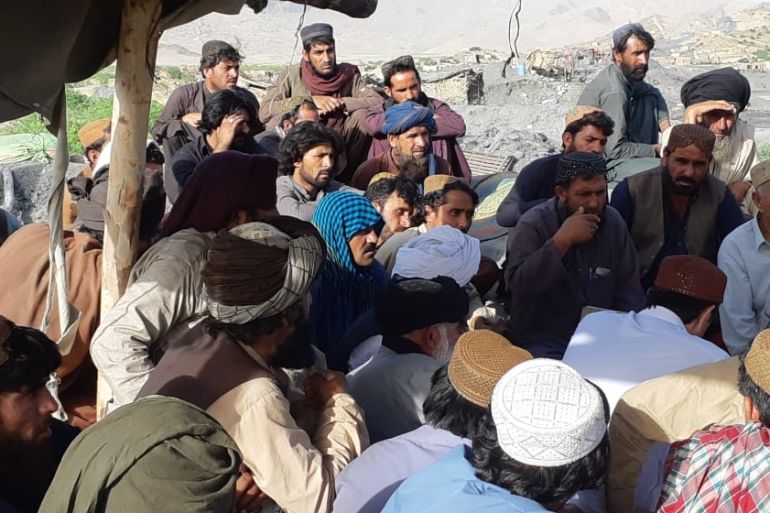‘Dead or alive’: Pakistani men trapped in coal mine since May 4
Families and rights groups condemn the government after whereabouts of the two men are not known in Balochistan.

Quetta, Pakistan – For nearly a month now, rescue officials in Pakistan’s southwestern Balochistan province have been searching for two men trapped inside a coal mine, as their anguished families prepare for the worst and demand their bodies.
The two coal miners have been trapped since May 4 inside the mine in Dukki district, 320km (198 miles) from Balochistan’s capital Quetta, the hub of Pakistan’s coal production.
Keep reading
list of 4 itemsAfghan Hazara’s journey to Pakistan for work meets brutal end
Gunmen kill many Hazara Shia coal miners in southwest Pakistan
Twin mining accidents kill 23 in Pakistan
“Rescue workers have dug 900 feet [274m] into the mine and are now digging from all four sides to locate the miners, but the chances of finding them alive are quite bleak,” Abdul Ghani, Balochistan’s chief inspector of mines told Al Jazeera.
“It would be a miracle if they are found alive,” he said.
The two men, 22-year-old Abdul Baqi and Sharafuddin, 26, were trapped after the mine collapsed following heavy rainfall, officials said.
Family members of the trapped miners have been camping close to the mine and have urged officials to hand over their bodies.
“We are tired of waiting and want our men back – dead or alive,” Abdul Sattar, a relative of one of the men, told Al Jazeera.
Local police officials say there is little hope of locating the men at all.
“Rescue workers are clueless about the [location of the] miners,” Syed Saboor Agha, a police officer in Dukki, said.

According to the relatives, both men belong to families struggling with extreme poverty.
They moved to Dukki from Kila Saifullah, another Balochistan district located 134km (83 miles) away in search of a better living. They made about $10 a day after a long day’s shift working deep inside the mine under hazardous conditions.
The agonising wait for the men has added to the miseries of the families struggling to put food on the table.
“Their parents and children are suffering from psychological trauma,” Azeem Khan, Baqi’s cousin, told Al Jazeera.
Balochistan is Pakistan’s largest but least populous and least developed province, where a large part of the population lives in poverty.
The province contributes 50 percent of the country’s coal production, with Dukki being one of its five leading coal-rich districts.
Residents refer to coal as “black gold” as working in mines earns them a higher daily wage than other such professions.
However, hazardous working conditions in the coal mines kill dozens of people every year. Landslides, methane gas blasts and industrial accidents are among the leading causes of casualties inside the coal mines across Balochistan.
According to Ghani, at least 27 miners have died and 14 were injured in mining-related accidents in the province so far this year.
At the site of the latest accident, more than two dozen rescue workers have been working day and night to recover the miners, but officials fear the two men are buried deep inside the muddy mine.
‘Black death holes’
Rights groups and labour associations have criticised mine owners, contractors and the government for their failure to improve the working conditions of the coal miners despite warnings by international labour rights organisations.
According to the Mines Act, introduced in 1923 by the British during their colonial rule over the subcontinent, mine inspectors must carry out checks and assess conditions each morning before letting the workers in. It also forbids children and women from entering or working in mines.
Pakistan is a signatory to the International Labour Organization’s Safety and Health in Mines Convention, but rights groups say that has done little to improve safety measures.
Peer Muhammad Kakar, a local representative of the All Pakistan Mines Association, accused the mine owners of “minting money at the cost of the miners’ [lives]”.
“These are black death holes, not mines,” Kakar said.
Miners and labourers from other parts of Balochistan have also been protesting in Quetta, urging the authorities to ensure an immediate end to the trapped miners’ misery.
Syed Fateh Shah Arif, a member of the mine owners’ association in Balochistan, told Al Jazeera the owners were paying huge amounts to the government’s mines and mineral department to ensure the safety of the miners. He said it was the government’s responsibility to implement the Mine Act.
However, rights activists say the mine owners rarely follow the procedures mandated by the law.
“The [Mines] Act is only in the books,” Tahir Habib, former chairman of the Human Rights Commission of Pakistan’s Balochistan chapter, told Al Jazeera.
He alleged that mine owners are rarely questioned due to their “strong presence in the legislative assemblies” and called for a probe into such incidents.